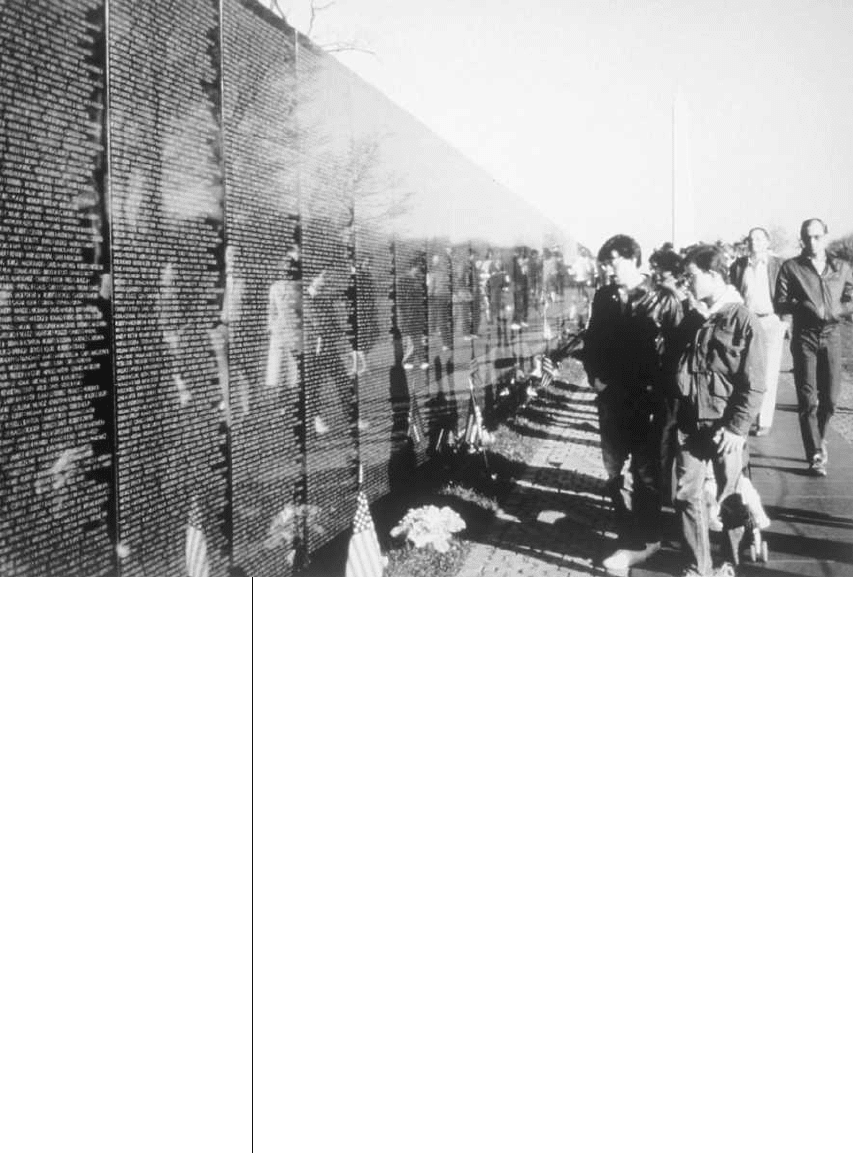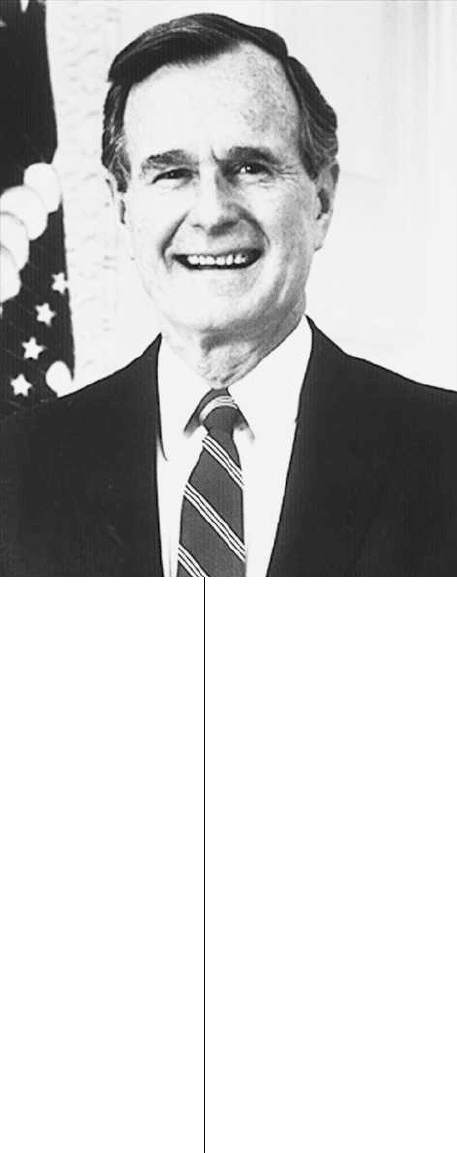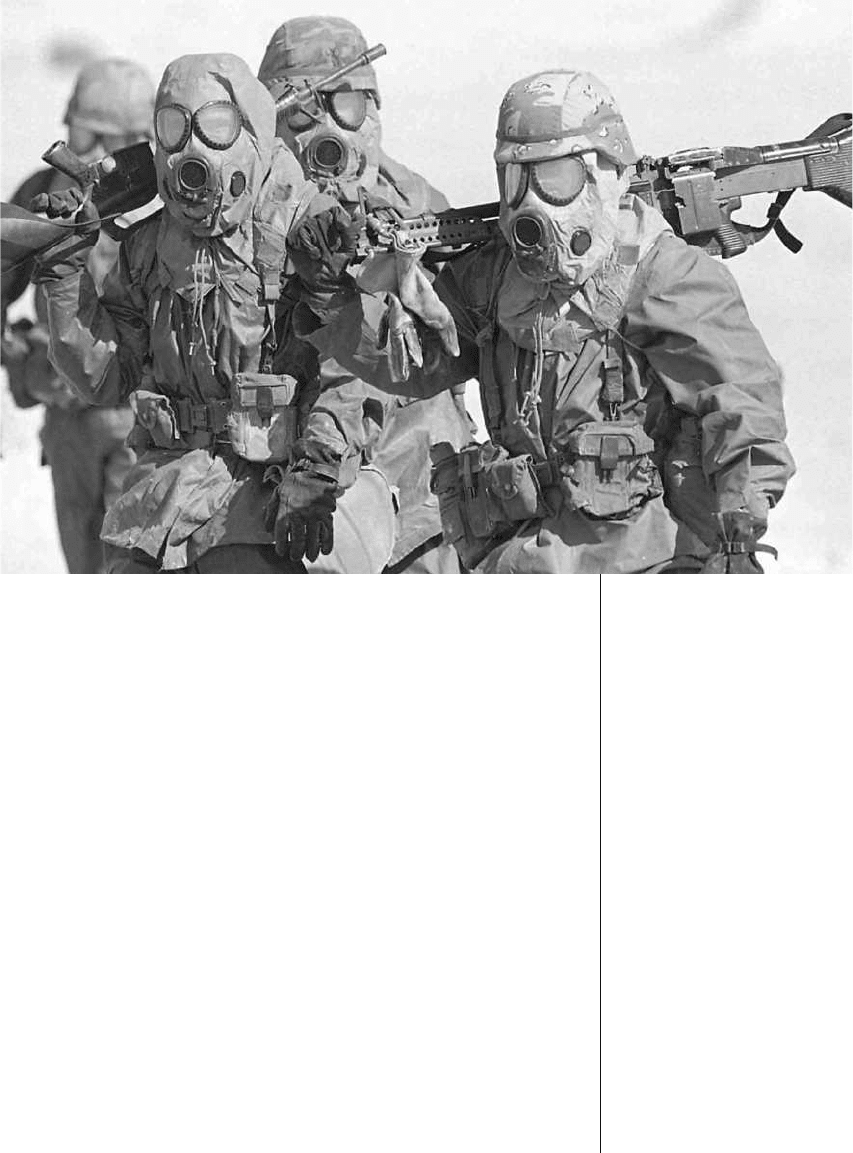Hillstrom K., Hillstrom L.C. Vietnam war. Almanac
Подождите немного. Документ загружается.


January 1981, on the same day that Reagan was sworn in to
succeed Jimmy Carter as president of the United States.
When the Americans who had been held hostage
returned home, they received a tremendous reception. Many
U.S. communities celebrated their release, and dozens of for-
mer hostages were treated to parades and patriotic cere-
monies. But these celebrations reminded many Americans of
how Vietnam veterans had been treated when they returned
home. “The hero’s welcome given the former hostages dra-
matized by contrast the point expressed by a growing number
of veterans,” writes Christian G. Appy in Working-Class War.
“They returned from Vietnam in virtual isolation, received no
national homecoming ceremonies, and lacked adequate med-
ical and psychological care, educational benefits, and job
training.” With this in mind, American communities began
taking steps to make up for their previous treatment of the
veterans.
The Wall
The single biggest factor in America’s changing per-
ception of its Vietnam veterans was the creation of the Viet-
nam Veterans Memorial. This memorial is commonly known
as “The Wall” because its dominant feature is a vast V-shaped
wall of reflective black granite on which the names of all Amer-
icans killed in Vietnam are listed.
The push to create a Vietnam Veterans Memorial was
led by Jan Scruggs, who was himself a veteran of the war. At
first, the plan for the wall was controversial. Some veterans
and other Americans objected to the design, which they saw as
an insulting change from more traditional monuments. But
others defended the design, which had been submitted by a
young Chinese-American art student named Maya Lin. After
months of bitter debate, the memorial was dedicated on
November 13 (Veterans Day), 1982.
In the months following the unveiling of the memor-
ial, the American people gave the memorial a ringing endorse-
ment. Family and friends of the dead soldiers and millions of
other Americans whose lives had been changed forever by the
war agreed that the monument was a powerful and moving
America Since the War (1976–Present) 283
VWAlm 187-294 7/30/03 3:10 PM Page 283

tribute to the men and women who died in Vietnam. “Criti-
cism was quickly overwhelmed by the public’s reaction,”
writes Isaacs. “Rarely in the long history of art, if ever, has an
object crafted from stone affected a society’s emotions so
widely and deeply as the Vietnam memorial. Most intense and
dramatic, perhaps, was its impact on the veterans themselves,
for whom the wall represented a place for healing and the end
of the long silence in which most had shrouded their experi-
ences for many years.”
Americans reconsider Vietnam
In the months and years following the unveiling of the
Vietnam Veterans Memorial, a wave of new films, television
shows, and works of literature about the Vietnam War also
appeared. As with earlier movies and books, these works por-
trayed the Vietnam conflict as a terribly violent, depressing,
284 Vietnam War: Almanac
Visitors at the Vietnam
Veterans Memorial Wall
in Washington, D.C.
Unknown source.
VWAlm 187-294 7/30/03 3:10 PM Page 284

and morally confusing war. Unlike earlier works, however,
many of the books, films, and television shows of the 1980s
portrayed veterans in a positive or even heroic way.
By the mid-1980s, it was clear that the American peo-
ple had adopted a new attitude toward the men and women
who had served in Vietnam. They now recognized that most
American soldiers had done their best in Vietnam under cir-
cumstances that were often terribly frustrating and frightening.
As Reagan declared in 1988, “ For too long a time, they [the
American Vietnam veterans] stood in a chill wind, as if on a
winter night’s watch. And in that night, their deeds spoke to us,
but we knew them not. And their voices called to us, but we
heard them not. Yet in this land that God has blessed, the dawn
always at last follows the dark, and now morning has come.
The night is over. We see these men and know them once
again—and know how much we owe them, how much they
have given us, and how much we can never fully repay. And
not just as individuals but as a nation, we say we love you.”
Of course, the American people—and Vietnam veter-
ans themselves—continued to disagree about nearly every
other aspect of the war. Friends, family members, and com-
munities remained divided about the morality of U.S. actions
in Vietnam. They also disagreed about the motivations and
influence of the antiwar movement of the 1960s and early
1970s. In addition, historians, military and political leaders,
veterans, and peace activists continued to express great differ-
ences of opinion on American military strategy, Vietnamese
hopes and desires, American press coverage of the conflict, and
a range of other war-related subjects. “On both sides [support-
ers and opponents of the war], there were some who found
moral clarity in the wartime choices they had made, or that
circumstances had imposed on them,” notes Isaacs. “But for
most, . . . the issues of an anguished time continued to defy
easy or comfortable judgments, remaining as painful and
morally confusing—or more so—as during the war itself.”
U.S. foreign policy after Vietnam
In the years following the war’s conclusion, memories
of Vietnam also had a major impact on U.S. foreign policy deci-
sions. Whenever the United States debated using military force
America Since the War (1976–Present) 285
VWAlm 187-294 7/30/03 3:10 PM Page 285

in another country, critics compared the situation to Vietnam.
In almost every case, American policymakers decided not to
commit its troops. As novelist and journalist Jack Fuller com-
mented, “[America] sees Vietnam everywhere, a ghost in every
conflict. Vietnam in Angola. Vietnam in Nicaragua. Vietnam in
El Salvador, in Guatemala, in Beirut. The ghost whispers con-
tradictory messages. To some it says, ‘Stay out [of the conflict].’
To others it says, ‘Fight this one to win.’ . . . From time to time,
politicians have proclaimed that we have finally put the war
behind us. But we have always proven them wrong.”
As the years passed, each new American president
insisted that the United States was prepared to use its military
might to protect its interests around the globe. They pointed
out that many nations looked to the United States—as the
world’s leading superpower—to intervene in conflicts that
threatened innocent peoples. But each administration reacted
very cautiously whenever military solutions were proposed for
international problems. After Vietnam, U.S. lawmakers simply
did not believe that the American people would tolerate any
military operations that endangered American soldiers. “Our
ineptness [incompetence] in Vietnam led many Americans to
question the wisdom of using our power at all,” explains for-
mer President Richard Nixon (1913–1994; president
1969–1974) in No More Vietnams. “Many of our leaders have
shrunk from any use of power because they feared it would
bring another disaster like the one in Vietnam.”
The Vietnam War also had a lingering effect on the atti-
tudes of America’s military leadership. Many members of the
nation’s armed forces believed that the U.S. military was not to
blame for the defeat in Vietnam. They rejected charges that
America’s failure in Vietnam could be traced to flawed military
strategies or clumsy military leadership. Instead, they blamed
America’s loss in Vietnam on timid civilian leadership and
weak public support for the war effort. This opinion was shared
by conservative legislators and many ordinary Americans.
This attitude led American military leaders to insist
that certain conditions be met before committing U.S. troops
to hazardous duty in foreign lands in the future. They told law-
makers that they never again wanted to commit troops with-
out overwhelming public support (although critics pointed
out that the American people voiced broad support for the
286 Vietnam War: Almanac
VWAlm 187-294 7/30/03 3:10 PM Page 286

Vietnam War throughout the first
three years of that conflict). They also
stated that before any military inter-
vention, they wanted clear military
objectives and permission to use over-
whelming military power. Finally, they
expressed determination to exercise
greater control over the news media in
future military actions. Many U.S. mil-
itary leaders believed that media cover-
age of the Vietnam War had poisoned
the American public’s attitudes toward
the conflict. They wanted to prevent
that from ever happening again.
Vietnam and the 1991
Persian Gulf War
In January 1991, the United
States launched its largest military
operation since the Vietnam War. This
operation in the Middle East came in
response to Iraq’s August 1990 inva-
sion of Kuwait, an American ally that
was a major source of oil for the United States. When Iraq
seized control of Kuwait, U.S. President George Bush (1924–;
president 1989–1993) organized a massive military build-up of
forces on the border of Kuwait. American military units
accounted for most of this build-up, but they were joined by
forces from a number of other nations as well. They warned
Iraq’s President Saddam Hussein (1937–) to remove his troops
from Kuwait, but Hussein refused to do so.
During the final months of 1990, Bush repeatedly
assured the American people that if the situation in Kuwait
exploded into war, “it is not going to be another Vietnam.” A
vocal minority of American citizens protested the U.S. military
presence in the Middle East. But Bush succeeded in convincing
most Americans that important U.S. national interests were at
stake in Kuwait.
In January 1991, the United States and its coalition of
allies launched a major air bombing campaign against Iraq. A
month later, they mounted a ground invasion of Kuwait.
America Since the War (1976–Present) 287
George Bush, who served
as president of the United
States from 1988–92,
launched the military
action called Desert Storm
in January 1991, resulting
in the Iraqi withdrawal
from Kuwait.
Reproduced by permission of
AP/World Wide Photos.
VWAlm 187-294 7/30/03 3:10 PM Page 287

These military actions quickly smashed the Iraqi military and
forced it to abandon Kuwait. With Kuwait freed from Iraqi con-
trol, some observers wanted the United States and its allies to
enter Iraq itself and overthrow the government of Iraqi Presi-
dent Saddam Hussein. But this idea did not have broad sup-
port. Arab members of the coalition objected to the idea of
overthrowing another Arab government, and the United
States worried that targeting Hussein might involve it in
another long and costly war.
Reaction to the Gulf War
The battle to liberate Kuwait—commonly known as
the Persian Gulf War—proved enormously popular with the
American public. The war ended quickly, with the U.S.-led
forces registering a decisive victory over the enemy. Moreover,
the successful attack on Iraq resulted in only light casualties
for the United States (148 American soldiers were killed; 458
were wounded). Americans were relieved and delighted by the
outcome of the war. As Anna Quindlen noted in the New York
Times, the Gulf War let Americans see themselves “as the lead-
ers of the world again, assured of their inherent [basic] great-
ness and the essential evil of the enemy.”
Both during and after the Persian Gulf War, American
communities flew millions of flags and yellow ribbons to show
their patriotic support for the U.S. troops operating in the Mid-
dle East. As Isaacs observes, “there was a palpable [detectable]
national thirst to make the war a successful and satisfying
event—the exact reverse of its experience in Vietnam.” This
attitude could clearly be seen in American news coverage of
the war, which Isaacs termed “more celebratory than skeptical
.... The vision of the war reaching the home front was pretty
clearly just what the public wanted. What it did not want,
unmistakably, was the kind of painful, morally confusing
information it remembered receiving about Vietnam . . . . The
war on Iraq was everything Vietnam had not been: a tri-
umphant display of American resolve, skill, and technology,
responding to a clear-cut act of aggression and waged against
a dictator who could plausibly be pictured as a sinister thug.”
After America’s big Persian Gulf victory, Bush declared
that the United States was no longer haunted by Vietnam.
“The specter [ghost] of Vietnam has been buried forever in the
288 Vietnam War: Almanac
VWAlm 187-294 7/30/03 3:10 PM Page 288

desert sands of the Arabian Peninsula,” he told American
troops in a radio broadcast. As it turned out, however, the vic-
tory over Iraq failed to change basic American doubts about
military operations in foreign countries. U.S. economic trou-
bles drained away Bush’s post-Gulf War popularity, and he lost
the 1992 presidential election to Democrat Bill Clinton
(1946–; president 1993–2000).
The American people, meanwhile, remained opposed
to any military operations that risked U.S. lives or long-term
involvement. This attitude convinced most observers that the
victory in the Persian Gulf War had failed to erase America’s
dark memories of Vietnam. As Newsweek columnist Meg
Greenfield noted in 1994, “Merely mention the possible use of
our military now any place on Earth and you will hear the pes-
simistic refrain: it will mean 500,000 ground troops, the mili-
tary will fail, the wily enemy will prevail, the terrain is inhos-
pitable, we will be hated, etc.” In fact, most experts agree that
these feelings were a major factor in America’s decision to
America Since the War (1976–Present) 289
Soldiers wearing chemical
masks and protective
combat uniforms, Operation
Desert Shield, 1990.
Reproduced by permission of
AP/World Wide Photos.
VWAlm 187-294 7/30/03 3:10 PM Page 289

avoid large-scale military intervention in the war-torn nation
of Bosnia during the mid-1990s. It also has led the United
States to secure broad support from other nations before it
considers military intervention in foreign countries.
Reestablishing diplomatic ties
with Vietnam
In the mid-1990s—more than twenty years after the
last American troops withdrew from Vietnam—the United
States finally established normal diplomatic relations with the
Vietnamese government. Reaching this agreement took much
longer than Vietnam had hoped. In fact, Vietnam repeatedly
290 Vietnam War: Almanac
Since the Vietnam War ended in
1975, some American veterans of the
conflict have returned to Vietnam to revisit
the jungles, villages, and cities that
dominate their wartime memories. In fact,
tourism officials estimate that several
thousand U.S. veterans returned to Vietnam
each year in the late 1990s. There are many
different reasons for their decisions to return
to Vietnam. Some of the veterans have
made the journey to assist in the rebuilding
of the nation’s war-torn communities. They
have helped build medical clinics, schools,
and bridges. Others have gone to Vietnam
to seek out former allies and enemies in
hopes of reaching a greater understanding
of the war.
But most veterans have returned to
Vietnam to mourn the deaths of comrades
and to come to terms with their own grim
memories of the war. “Going back to
Vietnam helped veterans put the war
behind them simply by letting them see
that it was over,” writes Arnold Isaacs in
Vietnam Shadows. “The scenery they
remembered—charred timbers that had
once been farmers’ houses, sandbagged
bunkers and sprawling coils of concertina
wire, little hills of expended shell cases
heaped untidily along blackened gunpits—
was no longer there. In its place was a
landscape of orchards, shimmering fields of
ripe rice, peaceful villages, gleaming-eyed
children on the swaying backs of water
buffaloes.” “For most [veterans], it is a
journey to see a land at peace that they last
saw in turmoil,” confirmed an American
who organizes tours of the country.
American Veterans Return to Vietnam
VWAlm 187-294 7/30/03 3:10 PM Page 290

tried to establish better relations with the United States during
the late 1970s and 1980s. Vietnam’s leadership recognized that
America’s diplomatic actions against their nation—including
an economic embargo (suspension of trade with a country)
that had begun in 1975—were hurting its economy and its
ability to interact with other countries.
But many U.S. political and community leaders
resisted Vietnam’s attempts to reach agreement with America.
They claimed that Vietnam was interfering too much in Cam-
bodia’s internal affairs, even though Vietnam had removed the
brutal Khmer Rouge from power. Other opponents of normal-
izing relations with Vietnam charged that American soldiers
from the Vietnam War are still held in captivity by the Viet-
namese government. This controversy over the fate of Ameri-
can soldiers classified as MIAs (Missing in Action) in Indochina
became a major barrier to establishing diplomatic ties, even
though many experts reject the theory that American soldiers
remain imprisoned in Vietnam as a myth. Finally, some Amer-
icans resisted normalizing relations with Vietnam because
they were still angry about the outcome of the Vietnam War.
As time passed, however, U.S. business leaders and
many political and community leaders declared their support
for normal relations with Vietnam. These supporters of nor-
malization ranged from people who had been at the forefront
of the Vietnam-era antiwar movement to Vietnam veterans
who had endured imprisonment and torture during the war.
In the early 1990s, the United States and Vietnam
reached agreement on a general plan to improve relations
between the two nations. As part of the plan, Vietnam agreed
to help investigate the fate of American MIAs in Indochina, as
well as to return the remains of U.S. soldiers to American soil.
The Vietnamese government also agreed to free all prisoners
who had been jailed for wartime activities or affiliations.
According to most observers, the Vietnamese government
cooperated in all of these areas.
In 1992, the Bush administration approved U.S. dealings
with Vietnam for “humanitarian” purposes. It also relaxed
restrictions on travel, communications, and relief agency activi-
ties in Vietnam. A year later, President Clinton changed U.S.
policies so that American firms could participate in development
projects in Vietnam. In February 1994, Clinton completely
America Since the War (1976–Present) 291
VWAlm 187-294 7/30/03 3:10 PM Page 291

removed the embargo. On July 11, 1995, complete diplomatic
relations were established between the two countries. Since
then, on July 12, 2000, the United States and Vietnam signed a
sweeping trade agreement, granting Vietnam the same trading
rights with the United States that most other nations have. Con-
gress is expected to approve the pact.
Some Americans strongly disagreed with Clinton’s
overtures to Vietnam. These opponents included anti-Com-
munist lawmakers, some Vietnam veterans, and organizations
associated with the MIA issue. But the majority of Americans—
including large numbers of Vietnam veterans—expressed sup-
port for normalizing relations. As one U.S. veteran of the war
commented, establishing normal diplomatic and trade rela-
tions with Vietnam does not “dishonor the memory of our
fallen or missing comrades. It is to recognize the truth. The war
is over.”
Sources
Appy, Christian G. Working-Class War: American Combat Soldiers and Viet-
nam. Chapel Hill: University of North Carolina Press, 1993.
Baritz, Loren. Backfire: A History of How American Culture Led Us Into Vietnam
and Made Us Fight the Way We Did. New York: William Morrow, 1985.
Ehrhart, W. D. Passing Time. Jefferson, NC: McFarland, 1989.
Franklin, H. Bruce. M.I.A. or Mythmaking in America. Brooklyn, NY:
Lawrence Hill, 1992.
Hellman, John. American Myth and the Legacy of Vietnam. New York:
Columbia University Press, 1986.
Isaacs, Arnold R. Vietnam Shadows: The War, Its Ghosts, and Its Legacy. Bal-
timore: Johns Hopkins University Press, 1997.
Kahn, Joseph. “U.S. and Vietnam are Said to Agree on Normal Trade,” New
York Times, 13 July 2000. national edition.
Kovic, Ron. Born on the Fourth of July. New York: McGraw-Hill, 1976.
MacPherson, Myra. Long Time Passing: Vietnam and the Haunted Genera-
tion. Garden City, NY: Doubleday, 1984.
Marshall, John Douglas. Reconciliation Road. Syracuse, NY: Syracuse Uni-
versity Press, 1993.
Nixon, Richard. No More Vietnams. New York: Arbor House, 1985.
Palmer, Laura. Shrapnel in the Heart: Letters and Remembrances from the Viet-
nam Veterans Memorial. New York: Random House, 1987.
292 Vietnam War: Almanac
VWAlm 187-294 7/30/03 3:10 PM Page 292
